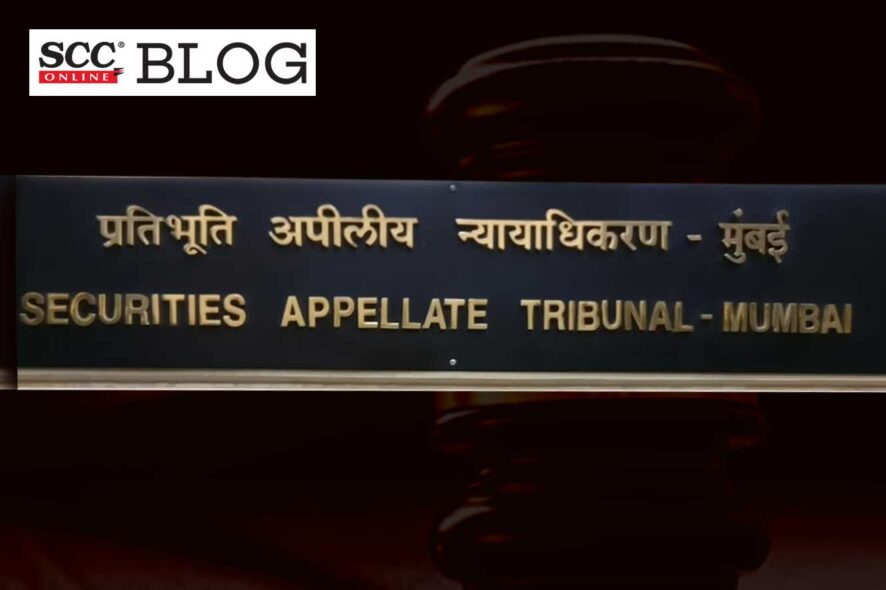Securities Appellate Tribunal, Mumbai (SAT): While quashing the appeal preferred by the appellants against the order dated 12-05-2022 passed by the Securities and Exchange Board of India (“SEBI”), the coram of Tarun Agarwala, J. (Presiding Officer), M.T. Joshi, J. (Judicial Member), Meera Swarup (Technical Member) held that the appellants not being an “aggrieved person” as they were not part of the Offer for Sale (‘OFS’) and therefore, cannot file appeals questioning the legality and veracity of SEBI’s order granting exemption to the Tamilnad Mercantile Bank Limited (‘Bank’) under Regulation 300 of the SEBI (Issue of Capital and Disclosure Requirements) Regulations, 2018 (‘ICDR Regulations’).
Facts:
An instant appeal has been filed challenging the order of SEBI through which the appellants were restrained from participating in the recent Pre- Initial Public Offering (‘IPO’) of the Bank and sell their shares through OFS.
The appellants made a representation to SEBI being aggrieved by their non- inclusion to participate in OFS. On 4-09-2021, Bank issued Draft Red Herring Prospectus (‘DRHP’) for a mix of fresh issuance of equity shares and OFS by the existing shareholders. As a result of the limitations indicated in the DRHP, the appellants holding equity shares of the Bank which were disputed were not allowed to participate in the OFS and being aggrieved by such action of the Bank, the appellants filed a writ petition in the High Court of Bombay challenging the decision of the Bank.
During the pendency of the matter, the Bank filed representations dated 08-11-2021 and 15-12-2021 before SEBI contending that they should be allowed to modify its draft prospectus and remove OFS from it without filing a new prospectus. SEBI accorded the exemption to the Bank in exercise of power to relax strict enforcement of the regulations under Regulation 300 of the ICDR Regulations. The instant appeal was filed also challenging this exemption granted by the SEBI to the Bank on the ground that the company was bound to issue a fresh resolution upon changes in the prospectus as per Sections 61(1)(c) and 28 of the Companies Act, 2013.
Arguments:
The senior counsel for the appellant contended that the impugned order was passed without any application of mind and no satisfaction was recorded while granting the exemption under ICDR Regulations. He relied on Shanti Devi v. State of U.P., (1997) 8 SCC 22 wherein it was held that satisfaction is required to be recorded. The counsel further argued that once the OFS has been withdrawn a fresh resolution is required to be passed by the shareholders under the Companies Act, which was not done. Hence, the exemption under the ICDR Regulations could not be given. Further, the proceeding was initiated by the Directorate of Enforcement under Foreign Exchange Management Act (‘FEMA’) and there was no restraint order from any court of law or authority restraining the appellants from disposing of the shares in question.
The counsel for the Respondent’s contended that the exemption granted to the bank was provided from fresh filing of offer prospectus for removal of OFS from the public issue. Further, it was argued that appellants have no locus standi as they are not aggrieved and that their shares were not eligible for OFS and were rightly not included in the DRHP.
Observation and Analysis:
The Court opined that the writ petition is pending before Bombay High Court. Hence, it is not open to the appellants to file the present appeals questioning the DRHP and or its withdrawal by some of the appellants with regard to OFS.
The Court held that there is no legal right of the appellant that has been infringed and they have neither suffered any injury nor any legal wrong. Also, as they were not part of the OFS at the first place, the appellant is not an “aggrieved person”. Hence, the shareholders cannot file appeals questioning the legality and veracity of SEBI’s order.
The Court opined that SEBI follows a disclosure-based regime and does not regulate on merits or approve an offer document such as the DRHP but only mandates true and fair adequate disclosures.
The Court found the application of the Bank in accordance with the ICDR provisions with a view to ensuring that adequate disclosures in the DRHP are made to enable the investors to make an informed decision.
[Robert & Ardis James Company Ltd. v. SEBI, 2022 SCC OnLine SAT 210, decided on 02-09-2022]
Advocates who appeared in this case:
For the appellants:
Dr. Abhishek Manu Singhvi, Senior Advocate,
Mr. M.S. Krishnan, Senior Advocate,
Mr. Janak Dwarkadas, Senior Advocate,
Mr. Avishkar Singhvi, Ms. Ankita Singhania, Mr. Kunaal Shah, Ms. Shruti Rajan, Mr. Ashish Bhan, Mr. Mohit Rohatgi, Mr. Anirudh Kapoor, Mr. Anubhav Ghosh, Mr. Kartik Adlakha, Mr. Vivek Shah, Mr. Avirup Mandal, Ms. Aastha Kulshreshtha, Mr. Kaustub Narendran and Ms. Lisa Mishra, Advocates i/b Trilegal.
For the Respondents:
Mr. Akash Rebello, Advocate with Ms. Nidhi Singh, Ms. Deepti Mohan, Ms. Binjal Samani, Ms. Moksha Kothari and Mr. Niket Dalal, Advocates i/b Vidhii Partners. Mr. Somasekhar Sundaresan, Advocate with Mr. P. Prabhakaran, Advocate i/b Consulta Juris.
Mr. Pradeep Sancheti, Senior Advocate with Ms. Nidhi Singh, Ms. Deepti Mohan, Ms. Binjal Samani, Ms. Moksha Kothari and Mr. Niket Dalal, Advocates i/b Vidhii Partners. Mr. Somasekhar Sundaresan, Advocate with Mr. P. Prabhakaran, Advocate i/b Consulta Juris.







